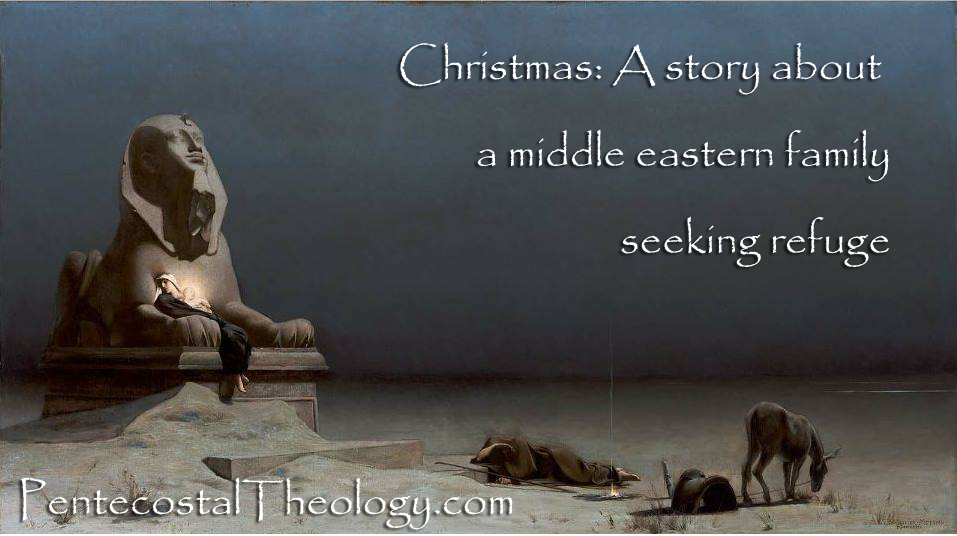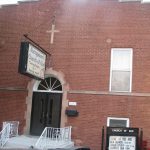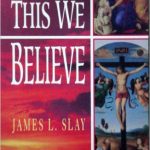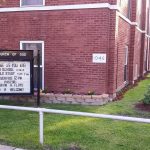Restorative Significance of the Gifts Given to the Christ Child
 It is recorded that the Magi gave the Christ Child three gifts upon his birth; gold, frankincense and myrrh. We understand the gold today as a physical gold, representing His kingship and the other two as an incense to symbolize his priestly role and oil for his foreseen death. Yet, what if the gold that was given to the Christ child was for another reason and perhaps it was not “gold”, but a golden spice or a golden salt. Of the gifts, one could be ingested, one could be inhaled and one could be absorbed. If we look at all from a medicinal viewpoint, these three gifts may have more symbolic meaning than once perceived.
It is recorded that the Magi gave the Christ Child three gifts upon his birth; gold, frankincense and myrrh. We understand the gold today as a physical gold, representing His kingship and the other two as an incense to symbolize his priestly role and oil for his foreseen death. Yet, what if the gold that was given to the Christ child was for another reason and perhaps it was not “gold”, but a golden spice or a golden salt. Of the gifts, one could be ingested, one could be inhaled and one could be absorbed. If we look at all from a medicinal viewpoint, these three gifts may have more symbolic meaning than once perceived.
MAGI
So who exactly were the “Magi”. We know that they followed the stars and were from the East. The East was a region of the world known, at the time, for its great knowledge of natural remedies. So it is not unimaginable that they could have been natural healers or homeopathic doctors of their times. This could explain the hypothesis that all three gifts had a therapeutic purpose in the life of Christ.
GOLD
If we view the gold in compound form, it can be used in the treatment of rheumatoid arthritis. Gold is a type of disease-modifying anti-rheumatic medicine (DMARD) that dampens down the underlying disease process. This meaning it treats inflammation and stops the immune system from attacking its own body’s tissue. Gold can also be used to treat other auto-immune conditions. If we think of the gift of gold as a spice, the first one that comes to mind is curcumin which is known as the “golden spice” of the East. It also has the ability to reduce inflammation and provides immune system support along with anti-cancer effects. This golden spice seems to have the ability to kill cancer cells and prevent their regrowth.
FRANKINCENSE
When frankincense is inhaled, it is the most effective method of delivery to send a chemical message to the brain. The oils in frankincense have a high level of sesquiterpenes, an agent found in plants that has the ability to go beyond the blood-brain barrier. Sesquiterpenes from frankincense increase oxygen availability in the limbic system of the brain which leads to an increase in secretions of antibodies, endorphins and neurotransmitters. In layman’s terms it has the ability to go straight to the brain without traveling through the bloodstream and brings healing properties to reset and repairs its internal communications. It’s almost as if it can unlearn a disease or degenerative disorder passed down in our DNA.
The amygdale glad of the brain’s limbic system plays a major role in storing and releasing emotional trauma. The only way to stimulate this gland is with fragrance or the sense of smell. This may help us understand how we are able to release emotional trauma with aromatherapy of frankincense.
MYRRH
Myrrh also can arouse the limbic system to release emotional trauma. It also has anti-inflammatory and immune boosting properties among with many other health benefits. Once applied to the body, oil molecules pass through dermis, into the capillaries and directly into the bloodstream.
The substance known as monoterpenes are present in almost all essential oils. They are what enhances the therapeutic values of other components and are the balancing portion of the oil. They inhibit the accumulation of toxins and restore the correct information in the DNA of the cell. Sesquiterpenes are also found in myrrh and delete the bad information in cellular memory or memories that are hypothesized to be stored outside the brain in the body.
REMARKS
This is quite interesting, to say the least, that all three gifts can protect the body from such dramatic trauma. The body of Christ from infancy was being safeguarded against what was to become his destiny of great suffering and pain. The cathartic releasing of emotional trauma provided with the gift of frankincense would lay the foundation for the harrowing experience of death by crucifixion.
All three offerings had anti-inflammatory properties and helped support the immune system by preventing the system from attacking its own body’s tissue. Christ’s earthly body was protected right down to the minuscule cellular level. Even the cellular memory of his body was restored with these gifts. At a molecular level, His Heavenly DNA was being guarded. The gifts purposed to protect the Christ child from disorders genetically passed down and to restore the information in the cells of the DNA.
One gift was for the body, one was for the blood and one was for the brain. One gift purposed to go beyond the blood-brain barrier while the other was via the bloodline. The Christ child was both a descendant of a Heavenly father and an early mother. The father’s bloodline was supernatural while the mothers’ was a physical line.
We will never truly understand this side of Heaven all the care that went into protecting the Christ child. Yet since we are descendants of a Perfect Deity, we too have this promise of complete restoration of curses, sickness, disease, imperfections, degenerative disorders, mental impairments, and any physical, mental or spiritual attack of the body, mind and soul. We have been given a choice of living a life of blessing or curse. Just as the gifts of the Christ child had to be accepted, we too much choose to accept this promise.
Greek-Bulgarian Interlinear of the New Testament Released on All Saints Day for the 500th Anniversary of the Protestant Reformation
Our decade long work of “Greek-Bulgarian Interlinear of the New Testament with Critical Apparatus Based on Nestle-Aland 27/28 and UBS-5” in Bulgaria is now released
After working on the New Bulgarian Translation of the Bible since 1996 and more actively on the interlinear version for the past decade, on October 31, 2017 for the 500th Anniversary of the Protestant Reformation in the Bulgarian capital of Sofia on All Saints Day 2017, we presented hot off the press the first edition of the Greek-Bulgarian Interlinear of the New Testament from the critical edition of GNT.
On the picture, a symbolic stack of the first 95 copies arranged at the presentation to commemorate with the work of the great reformers.
Greek-Bulgarian Interlinear of the New Testament with Critical Apparatus: Addressed Problems and Proposed Solutions
Releasing our decade long work of “Greek-Bulgarian Interlinear of the New Testament with Critical Apparatus Based on Nestle-Aland 27/28 and UBS-5” in Bulgaria
After twenty some years in Bible translation and a decade long work on this current edition, we are happy to announce that on the 500th anniversary of the Protestant Reformation, our Greek-Bulgarian Interlinear of the New Testament will be presented in Bulgaria’s capital Sofia on All Saints Day 2017. The Greek Bulgarian Interlinear of the New Testament proposes the following solutions to the translation of the Bible in Bulgarian:
- A non-received test – Textus Haud Receptus
- Critical Edition of the Greek New Testament alike Revised Textus Receptus, Tischendorf, Westcott and Hort, von Soden, Nestle-Aland, UBS and SBL GNT
- Literal translation from Greek made word for word without dynamic equivalents
- Linguistic paradigm for repetitive parallel permutation structures in the Greek-Bulgarian translation alike form criticism of the Bible
- Analytical Greek New Testament with complete morphology of the words
Announcing our Greek-Bulgarian Interlinear of the New Testament with Critical Apparatus
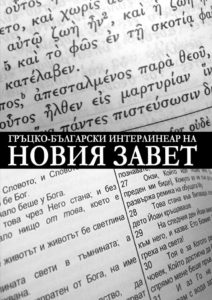 Releasing our decade long work of “Greek-Bulgarian Interlinear of the New Testament with Critical Apparatus Based on Nestle-Aland 27/28 and UBS-5”in Bulgaria
Releasing our decade long work of “Greek-Bulgarian Interlinear of the New Testament with Critical Apparatus Based on Nestle-Aland 27/28 and UBS-5”in Bulgaria
October 31, 2017 marks the 500th Anniversary of the Protestant Reformation. For this commemorative occasion, occurring only once every seven generations, we will be presenting a decade long work of ours in the capital Sofia. On All Saints Day 2017, the first edition of the Greek-Bulgarian Interlinear of the New Testament from the critical edition of GNT will be released. A symbolic stack of the first 95 copies arranged at the presentation will commemorate the work of the great reformers.
After working on the New Bulgarian Translation of the Bible since 1996 and more actively on the interlinear version for the past decade, we are hoping to address the following problems within the current revision of the Bulgarian Protestant Bible:
- Lack a definite orientation toward the critical edition of the Greek New Testament
- Revisions made on the basis of older revisions separating the current Bulgarian Revision from the true meaning of the Bible
- Diverse Biblical text tradition with undefined sources, base texts and methodology of revision
- Need of analytical Greek New Testament with proper morphology
- Interlinear edition, combining New Testament Greek and modern day Bulgarian based on the critical edition of the Greek New Testament
The 1923 Church of God Report of Investigation on A. J. Tomlinson
June 1, 2017 by Cup&Cross
Filed under Featured, News, Publication, Research
 Report Of Investigation Proceeding of Elders Council and Correspondence
Report Of Investigation Proceeding of Elders Council and Correspondence
Convened at Cleveland, Tennessee June 12-21, 1923
A.J. Tomlinson
This section is to not only show forth who A.J. Tomlinson was in scripture but also to show forth the personality and character of Bro. A.J. Tomlinson. Those who would not care to read an autobiography would at least get a glimpse of the type of man he was and the life he lived for God.
Jesus spoke of John the Baptist in Luke 7:26-28..but what went ye out for to see? A prophet? Yea I say unto and much more than a prophet.This is he of whom it is written, behold I send my messenger before thy face which shall prepare the way before thee. Luke 3:4– as it is written in the book of the word of Esaias (Isa 40:3) the prophet saying the voice of one crying in the wilderness prepare ye the way of the Lord make his path straight.
Why did Jesus say John was much more than a prophet? John didn’t prophesy. Because when John stepped out on the scene prophecy began to be fulfilled. [This is he of whom it is written] it was written, John was who Isaiah had prophesied of, the man God had chosen to be the forerunner of Christ
So as with A. J. Tomlinson, it was written, he was not John the Baptist, nor Elijah, But He was a man chosen by God to fulfill prophecy, he was a prophet. Bro Tomlinson had for some time been searching for the bible plan, he was drawn by the Spirit of God to engage his heart and draw near unto him [Psalm 65:4-blessed is the man whom thou choosest and causest to approach unto thee that he may dwell in thy courts: we shall be satisfied with the goodness of thy house even of thy holy temple] [Jer 30:21- and their nobles shall be of themselves and their governor shall proceed from the midst of them and I will cause him to approach unto me, for who is this that engaged his heart to approach unto me? Saith the Lord]
These prophecies were fulfilled June 13 1903 as Bro Tomlinson went to the top of Burger Mountain North Carolina to pray and seek the Lord. He prayed and prevailed with God. After prayer he came down from the mountain and declared that they [people @ holiness church @camp creek] were “The Church of God” taking the whole bible rightly divided as their only rule of faith and practice. Thus the Church of God was founded and Bro Tomlinson was chosen as pastor.
[Insert from autobiography of A.J. Tomlinson written by Lillie Duggar]
A multitude of people were gathered together at the foot of Burger Mountain in North Carolina, Sunday afternoon September 7, 1941…..The General Overseer explained the purpose of the meeting and gave a brief history of events in connection with Fields of the Wood. A portion of his message follows: “one thing special that has accompanied all the way is that we have had a vision of it, understood it, obeyed it, and walked in the light before we knew it was in the scripture. Afterwards we found it in the scripture. We knew this place was here a long time ago, but we didn’t know it was the Fields of the Wood. We just didn’t know it, but it finally came out until you can see it is now marked the Fields of the Wood. Those who do not know specially about it are interested to know how it became Fields of the Wood. It was read here in scripture lesson how it came to be the Fields of the Wood. “David was a prophet. He searched but he didn’t know. He knew there was something to be done but he didn’t know how or where. By and by in his vision he found what he was hunting for. He found it in the Fields of the Wood. But he didn’t live to see it. People think it is some spiritual something, but here it is. It is the Fields of the Wood. David found it in a spiritual way in his vision, but it was left for me, A.J. Tomlinson, to really do this and find it here. I want to give you a little history, also speak in regard to the airplanes, because the airplanes are the last days product. The Church of God is the last days product. And they go hand in hand. This is rather peculiar.
“Right here was organized in May, 1902, what was called the Holiness Church at Camp Creek. After thirteen months they called me to come to their meeting they had called for the thirteenth day of June, 1903. I came with the understanding we were going to search the Bible to see if we could find the Church of God, just like David said we would find it. I came and after staying all night with Brother Bryant I got up next morning, had prayers, ate breakfast, and took out up the mountain. I was gone for an hour or more. I came back down the mountain and entered the meeting. Questions were asked, Bible answers given, they said they took the whole Bible rightly divided as their only rule of faith and practice. I said “well if you take the whole Bible rightly divided, that makes it the Church of God. Why do you want to call it the Holiness Church at Camp Creek? They agreed with me but couldn’t answer the question. Then I said “you have agreed that this that I have said makes it the Church of God, and you are willing to take it and keep it The Church of God? They said they were willing to take me in with the understanding that it is the Church of God—– not going to be—– but is the Church of God. So I stood right there in front of the fire place and Bro Spurling took the Bible and gave it to me. He handed it to me and said, “Will you take this as the Word of God, believe it and practice it, and obey its precepts and walk in the light as God is in the light? I thought deeply. I remembered what a time I had on the mountain. I meant business, God meant business, David meant business, and Isaiah meant business when he said “Arise shine” for thy light is come. That is the Church of God. Nobody could help it, nobody could keep it from it. That is the Church of God. Nobody else had said it. Nobody had stepped out boldly like that and declared this is the Church of God. No guess work about it. “I will build my church and the gates of hell shall not prevail against it” That was the starting, but it had been covered up with creeds until nobody knew where it was. It had been covered up long enough and God said, “Arise shine” and it came. It is the Church of God, and I had to do that. I didn’t make any plans about it. I didn’t make arrangements for it. When the time came that thing had to be done.
“I believe I can say as well as Paul that for this purpose God raised me up” Why not? Who else did it? Who else would do it? Like the apostle Paul said, I magnify mine office. And like John the Baptist, I was just a voice of one crying in the wilderness. You never saw my name in there, but without a name I was there. It just turned out to be me and nobody can help it. Where would this have been if it hadn’t been for me? I am not boasting only as God has done this for me. Where has anything ever happened like this? Right here I gave my hand to Bro. Spurling, who was not a Church of God member exactly like we are, but he and others were spiritual and good. But they never brought us up and said we are the Church of God. I said it and because I said it, God has been honoring it ever since. You are the Church of God because I am. We didn’t have anything to happen at that time, but it was a starting point. This is the place. I didn’t do it, but some power got hold of me and I believe it was the power of God…..
Light began to shine. Prophecy began to be fulfilled (Isiah 60:1,2– Arise shine, for they light is come, and the glory of the Lord is risen upon thee. For behold, the darkness shall cover the earth and gross darkness the people, but the Lord shall arise upon thee and his glory shall be seen upon thee) Match stick light but what a great light it was! While the church had the “Arise shine” The same year 1903, same state North Carolina. The Wright brothers were working on their flying machine and finally staged their first flight December 17 1903. The church came up in the North Carolina Mountains “The land of the sky” while the airplane came up on the sand dunes in the opposite corner of the state fulfilling theIsaiah 60:8 prophecy “Who are these that fly as a cloud and as doves to their windows?
Two other prophesies being fulfilled were Isaiah 2:2 and Micah 4:1– “ And it shall come to pass in the last days (plural) that the mountain of the Lord’s house shall be established in the top of the mountains (plural) And shall be exalted above the hills and all nations shall flow into it. InLuke 6:12-13, Mark 3:13-14, Jesus went on top of Mt Hattin to pray and then ordained 12 apostles establishing the early church. Bro Tomlinson went up to Burger Mountain to pray, coming down he found the Church of God. Even Moses set in order a church in the wilderness and was given that pattern on Mt Sinai this being a shadow of good things to come and not the very image.
From 1903 to 1923 Bro Tomlinson poured his heart and soul into the church. His whole life was dedicated to serving God and the church. In 1923 ten of the elders rose up against Bro Tomlinson and there was a separation.
[Insert from the A.J Tomlinson biography written by Lillie Duggar]
In the call council [August 8 1923] This council condemned the action of the rebellious elders in placing F.J. Lee in the position of General Overseer, because of the fact that no provision was made for such action either in the bible, the constitution, or the assembly minutes. In the 18thannual assembly November 22-27 1923 Bro Tomlinson made it clear in his address that he recognized the office of the Holy Ghost which had been disregarded in the last assembly and that he wanted him to be honored, exalted and obeyed.
In a few plain words A.J. Tomlinson made known what he was standing for without compromise. And we are sure he meant just what he said for he proved it again and again during the years that followed. Here are his word concerning this:
“Before closing I wish to make it clear that I am standing four square for the Bible, and the New Testament as our only rule of faith and practice. Just like we obligated ourselves years ago. I repudiate every action of the Assemblies that has had any tendency toward making the assembly a legislative body, or adding any constitution, laws or creeds. I stand for the Church of God just as I have taught it for years which most of you know. There is no compromise, no let down, no weakening to gain favor of man….”
At the assembly in 1922 bro Tomlinson in his statistical report showed there were 666 churches, 923 ministries, and 21,076 members. The local church property was valued at $292,613.45 and the property at headquarters was valued at $140,500. The equipment and stock on hand were not included in this. All of this had been built from one small church in less than 20 years. It really took a man of strong courage, great faith, and mighty determination to accomplish a task of this magnitude under the existing conditions.
What would it do for most people to have about 20 years of labor wiped out by what might be called one stroke of the hand? And what would it do for many people to have this done to them by those who had been their trusted friends and co-workers because the business was prospering and they wanted control of it? And more than that, what would it do to most people for those they had lifted up and appointed to positions of trust and in a sense made them what they were in the Church of God to betray their trust by turning against their benefactors and saying all manner of evil against them?
These are questions that may not be answered. But it is doubtful if many people would have done as A.J. Tomlinson did. Very few if any would have had the courage to start all over again at the age of 58 years to build the Church of God. But God had chosen him for the position of General Overseer and the spirit of this position was upon him and he could not quit. Besides this he had a vision of the Church of God and he knew the prophecies concerning it, and he realized the work had to be done because the church had to be that pure, spotless Church at the time of the presentation to Jesus Christ, so there was nothing for him to do but to keep on keeping on. It is very doubtful if he ever entertained a thought of giving up and quitting. The writer never heard him express himself in any way that would indicate he did. His only thought was doing what he could to get the work done. The zeal of the Lord of Hosts constantly burned within him and he had to do what he could for God and the up building of His Church.
Going forward:
Bro Tomlinson was true to what God had called him to do. God was with him and blessed his efforts everywhere he went and he was used mightily of the Lord.
[Insert from biography]
In his annual address before the assembly which convened September 8-14 1926, Bro Tomlinson states that he had traveled 20,160 miles by train, steamship, automobile, autobus, taxi, rowboat, gasoline launch, trolley car, and on foot. He attended 24 conventions and ministered in local churches and in as many other places, besides assisting in the work of the church at Cleveland when he was at home and carrying on his office work. After giving a description of his work and other information, he stated how he felt concerning his place in the Church of God:
“I have given this description of my work, receipts and expenses, because I feel it is my duty to do so in order that the assembly and whole Church may know something of my service and expenses. My whole soul is in building up and maintaining the institution for which my friends gave their lives to establish nineteen centuries ago. I believe I feel my call to this work as distinctly as the early apostles and church fathers. I may feel the responsibility for my part in these last days as strong as James did in the beginning, and when God’s anointing power takes possession of me I feel a boldness and courage that far surpasses the natural. It is then I see the impossibles transformed into victory and the hell gates of appositions melting like wax and vanishing like smoke. The anointing has been upon me more or less for years, and this year it has loomed up above any year of my experience. My bones are burning now with zeal and courage and a determination to do my part in lifting up the standard until the Church of God shall reach her final triumph….In concluding his address before the assembly that year, he said of himself: “speaking of myself, I wish to say that every drop of red blood in my veins, and all my strength and energy must be used for the Church of God. And I have no strength, no energy, no time or money to put into any other institution. I am conscientious about this. That is where the strength and time of the early disciples went and that is where mine must go…..I may be counted beside myself, but a spirit has taken possession of me, and it must be the spirit of the early apostles—the Spirit of God, that has so overwhelmed me that I don’t mind criticisms, don’t seem to mind anything except to see the Church of God rise to its full height and reach the measure of the stature of the fullness of Christ.
The entire life of A.J. Tomlinson was dedicated to the ministry and calling that God had placed upon him. Bro Tomlinson prayed and sought God over the years. Whatever God revealed to him he put into practice and begin walking in it.[ Ps 119:130– The entrance of thy words shineth light and giveth understanding to the simple, Ps 119:105- Thy word is a lamp unto my feet and a light unto my path] He was faithful until his death On October 2, 1943.
Note: Psalms 87:5- And of Zion it shall be said, This and that man was born in her and the highest himself shall establish her. That man was Bro Tomlinson, another prophet came on the scene in 1931, This man found that man [A.J.T.]
We as The Ephesus Church of God [4th part remnant] are continuing on in the vision that Bro Tomlinson saw in the word of God’s end time church, the glorious church not having spot, wrinkle, or any such thing, holy and without blemish. The bride of Christ that Jesus will return for. We continue to strive to walk in the light as he is in the light [1Jn 1:7] As God opens his word and shines upon our pathway we are determined to walk in it. And as we continue to walk in that light it will shine greater and greater until we walk in perfection.
Prov 4:18– But the path of the just is as the shining light, that shineth more and more unto the perfect day.
A.J. Tomlinson’s Diary (in 3 volumes) [full view, search, download]
May 1, 2017 by Cup&Cross
Filed under Books, Featured, News, Publication
A.J. Tomlinson’s Diary (in 3 volumes) [for full view, search and download]
Catalog Record: Diary of A. J. Tomlinson | Hathi Trust Digital Library
Vol. 3. p. 13 “Received the Holy Ghost about March, 1896” – [referring to… ?]
Vol. 3, p. 36 note on August 4, 1904 “Just arrived home from Drygo, Tenn., where we held a ten days meeting. Some converted, some received the Holy Ghost
Vol. 3, p. 49 June 14, 1907 Glorious results. Speaking in other tongues by the Holy Ghost.
Vol. 3, p. 52 August 19, 1907 One received the baptism with the Holy Ghost and spoke with other tongues.
Source: http://babel.hathitrust.org/cgi/pt?id=wu.89067290775;view=1up;seq=42
Christmas Book Sale: Psychological Exploration of Communist and Post Communist Bulgaria
In the past five years since 2011, we have authored over two dozen books related to our ministry and mission work in Eastern Europe. As several of the prints are now almost exhausted and second/third editions and several new titles are under way, we are releasing all currently available editions in a Christmas sale through the month of December. All titles are available at up to 30% off and Amazon offers free shipping and extra savings for bundle purchases.
Our book available on sale today is:
Psychological Exploration of Communist and Post Communist Bulgaria
Silence in the face of evil is itself evil: God will not hold us guiltless.
Not to speak is to speak. Not to act is to act.
~Dietrich Bonhoeffer
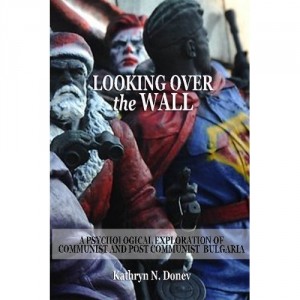 Surrounded with insecurity and uncertainty, the Bulgarian Evangelical believer finds great hope and comfort in the fact that God holds the future in His hands. Christianity is a reality that is certain. While having lived in a culture of oppression and persecution, the Bulgarian Evangelical believer now can trade a downtrodden spirit for one of triumph. The once atmosphere of turmoil is being transformed to one of liberation in the Spirit where chains of slavery are traded for a crown of joyous freedom. Living in the 21st century in a context of post communist and postmodern transformations, Bulgarian Evangelical believers must remain true to their historical heritage and preserve their identity in order to keep their faith alive. This unique testimony must be passed on to future Bulgarian generations by telling the story of the true Pentecostal experience.
Surrounded with insecurity and uncertainty, the Bulgarian Evangelical believer finds great hope and comfort in the fact that God holds the future in His hands. Christianity is a reality that is certain. While having lived in a culture of oppression and persecution, the Bulgarian Evangelical believer now can trade a downtrodden spirit for one of triumph. The once atmosphere of turmoil is being transformed to one of liberation in the Spirit where chains of slavery are traded for a crown of joyous freedom. Living in the 21st century in a context of post communist and postmodern transformations, Bulgarian Evangelical believers must remain true to their historical heritage and preserve their identity in order to keep their faith alive. This unique testimony must be passed on to future Bulgarian generations by telling the story of the true Pentecostal experience.
Obama, Marxism and Pentecostal Identity
Time and time again in the past several years, while ministering in churches across the United States, friends and partners ask us about our opinion on the political situation at home and around the world. Many of them ask the direct question of America becoming more and more socialist-like. Our response is that while people have the right to own a business, there cannot be communism, but this barely scratches the surface.
“Looking over the Wall” answers this and many other important questions about the current global reality from a very distinct Pentecostal and the same time post communist point of view. Yet, the text does it in a way, which can actually relate to popular American culture and current economic reality. The book provides Christian answers as of what defines our identity and makes us human – a right communism strips from the persona, the family and the church without much regard of the consequences that follow.
But this drastic dehumanization has an almost irreversible effect on the human psyche – a slavery mentality that penetrates the very heart of men and women and leaves forever its mark of fear, depression and insecurity. The book traces how Pentecostalism as faith and ideology has the power to deliver post communist communities from the grasp of oppressive governments and transform them into a socially relevant culture changing force. At the same time, it remains a warning to theologians who dare to flirt with Marxist idealism being fulfilled in the context of the New Testament ecclesia. And rightfully so!
The book is a must read for any and all who are ministering or planning to minister in a post communist culture or among post communist groups regardless of their geographical locale. For the principles it shows are valid for post community mentality everywhere. Preview and purchase your copy directly at Amazon.com
Christmas Book Sale: The CASE of a NATO CHAPLAINCY MODEL within the BULGARIAN ARMY
In the past five years since 2011, we have authored over two dozen books related to our ministry and mission work in Eastern Europe. As several of the prints are now almost exhausted and second/third editions and several new titles are under way, we are releasing all currently available editions in a Christmas sale through the month of December. All titles are available at up to 30% off and Amazon offers free shipping and extra savings for bundle purchases.
Our book available on sale today is:
THE CASE OF A NATO CHAPLAINCY MODEL WITHIN THE BULGARIAN ARMY (Submitted to the Manfred Wörner Foundation)
 In April 2004, Bulgaria was officially accepted into the global structure of the North Atlantic Treaty Organization (NATO). The event followed a long series of historic developments that were accomplished despite the existence of highly antagonistic forces that opposed the very idea of Bulgaria’s membership in any Western alliance. Among these were internal and external political, economical and social factors that historically have forced the country to remain under the influence of the forces opposing the West.
In April 2004, Bulgaria was officially accepted into the global structure of the North Atlantic Treaty Organization (NATO). The event followed a long series of historic developments that were accomplished despite the existence of highly antagonistic forces that opposed the very idea of Bulgaria’s membership in any Western alliance. Among these were internal and external political, economical and social factors that historically have forced the country to remain under the influence of the forces opposing the West.
As the country of Bulgaria is now a member of NATO and awaits acceptance into the European Union in 2007, international experts are working with various government institutions and consultant agencies to create an atmosphere in which the Bulgarian mindset can experience a new national revival in the 21st century. NATO’s involvement in this process serves as a catalyst both for reinforcing Bulgaria’s infrastructure and attracting international interest in the country’s affairs. Issues concerning national security, military involvement, international relations, economical development and ethnic diversity are continuously and carefully taken into consideration. However, one issue still remains untouched neither by NATO’s official position in Bulgaria, nor by the Bulgarian government. This is the issue of faith.
Three reasons make such topic of relevant importance. First, Bulgaria claims traditional and historical religious belongingness to the Eastern Orthodox Church. Furthermore, the centuries of religious wars on the Balkans have formed a complete dependency on ethnic religiosity, making faith the prime factor for animosity, hatred and genocide. Finally, the issue of morale and morality in the armed forces remains open for any military unit and will need to be addressed sooner or later in the context of NATO’s presence in Bulgaria.
This research will show how the above issues could be resolved by the presence of a NATO paradigm for chaplaincy within the Bulgarian Armed Forces. The paper will explore the current developments of chaplaincy in Bulgaria on three levels: church, society and government. It will then present the case of “underground chaplaincy” in Bulgaria and provide an appropriate solution to be implemented through the newly established Bulgarian Chaplaincy Association. The conclusion will outline the benefits that can be achieved by a partnership between local NATO representatives and the Bulgarian Chaplaincy Association who combine efforts to restore the spirituality within the Bulgarian Army through the legalization of chaplaincy ministry within its structures.
Also important [click to read]:
- U.S. Department of State recognizes our chaplaincy efforts in Bulgaria
- Bulgarian Chaplaincy Association: Integration Proposal with Local NATO Programs
- Bulgarian Chaplaincy Association: Vision and Resolution
- Chronology of our role and involvement in developing Church of God chaplaincy in Bulgaria since 2001
- Master’s of Chaplaincy Ministry Program in Bulgaria Reflections
- The Past Decade of Chaplaincy in Bulgaria (2006-2016)
- Related Publications and Presentations by Cup & Cross Ministries International
Chronology of our role and involvement in developing Church of God chaplaincy in Bulgaria since 2001
History of Events
05/12 Anticipated Date for Graduation of the First Cohort of Master’s Program of Chaplaincy Ministry in Bulgaria
2011
09/11 – Master’s of Chaplaincy Ministry Program Module 3: Counceling Completed
07/11 – Master’s of Chaplaincy Ministry Program Module 2: Theology Completed
03/11 – Master’s of Chaplaincy Ministry Program approved by the Educational Committee of the Bulgarian Evangelical Theological Institute
01/11 – Master’s of Chaplaincy Ministry Program Continues
2010
10/10 – Master’s of Chaplaincy Ministry Program Module 1: Chaplaincy Completed
09/10 Master’s of Chaplaincy Ministry Program begins in Sofia, Bulgaria
06/10 Chaplaincy Conference and Master’s of Chaplaincy for Bulgaria
01/10 Proposal masters program finalized and submitted for approval to the Educational Committee of the Bulgarian Evangelical Theological Institute
2009
10/09 Bulgarian Chaplaincy Association holds an introductory chaplaincy course in Yambol, Bulgaria
2008
12/08 Family Seminar for Military Men and Women held in Yambol
11/08 Bulgarian Chaplaincy Association Annual Meeting
09/08 – Bulgarian Chaplaincy Associations noted in Church of God publications
06/08 – The Case of a NATO Chaplaincy Model within the Bulgarian Army released
06/08 – Celebrating 10 Years of Military Ministry in Bulgaria
2007
10/07 – Bulgarian Chaplaincy Associations Recognized by U.S. Department of State
07/07 – National Chaplaincy Conference in Yambol, Bulgaria
03/07 – Bulgarian Chaplaincy Association was officially registered
02/07 – Bulgarian Chaplaincy Association gains legal status
01/07 – Bulgarian Chaplaincy Assassination noted by international religious freedom watch dog Forum 18
2006
12/06 – Registration Rejected Bulgarian Chaplaincy Association by Bulgarian court
11/06 – A master program in chaplaincy ministry has been proposed for the Bulgarian Evangelical Theological Institute in Sofia
10/06 – Bulgarian Chaplaincy Association Founder’s Meeting in Sofia, Bulgaria
10/06 – A contextualized course for chaplaincy ministry is offered at the Bulgarian Evangelical Theological Institute in Sofia
08/06 – Bulgarian Chaplaincy Association’s Resolution No. 1 sets course toward chaplaincy in churches, education and government institutions
07/06 – National Chaplaincy Meeting in Yambol, Bulgaria
06/06 – Meeting with NATO Chaplains
05/06 – Cup & Cross Ministries submitted a research paper to NATO’s Manfred Wörner Foundation dealing with the case of underground chaplaincy within the Bulgarian Armed Forces
03/06 – A contextualized course for chaplaincy ministry was offered in Veliko Turnovo
02/06 – www.kapelanstvo.com was released to serve as the official website of the chaplaincy movement in Bulgaria
2005
10/05 – A national training seminar held in Veliko Turnovo
10/05 – The Bulgarian Chaplaincy Association was presented before the Bulgarian Evangelical Alliance
09/05 – Regional meeting in Nova Zagora which addressed the current issues
08/05 – A regional chaplaincy meeting in Sliven
07/05 – Publication of camouflage New Testaments and Bibles, some of which we distributed to Bulgarian army personal including the divisions currently serving in Iraq
2004-2001
- Chaplaincy Conference and Master’s of Chaplaincy
- Chaplaincy Course in Yambol, BULGARIA
- Bulgarian Chaplaincy Association Annual Meeting
- Family Seminar for Military Men and Women
- Cup & Cross Ministries in Church of God Publications
- The Case of a NATO Chaplaincy Model within the Bulgarian Army
- 10 Years of Military Ministry in Bulgaria
- Bulgarian Chaplaincy Associations Recognized by U.S. Department of State
- National Chaplaincy Conference
- Bulgarian Chaplaincy Association Gains Legal Status
- Chaplain Dees Visits Bulgaria
- Chaplaincy Course at the Bulgarian Evangelical Theological Institute
- Bulgarian Chaplaincy Association
- Meeting the NATO Chaplain
- National Chaplaincy Meeting
- Chaplaincy Developments in Bulgaria
- U.S. Bases in Bulgaria
- National Chaplaincy Meeting
- Chaplaincy in Bulgaria
- HEALTHCARE CHAPLAINCY IN BULGARIA
- Chaplaincy in Bulgaria
- Mission Bulgaria
Chicago’s Narragansett Church of God, Rev. James L. Slay and the 1948 Church of God Declaration of Faith
October 25, 2016 by Cup&Cross
Filed under Featured, News, Publication
Rev. James Slay of the Narragansett Church of God in Chicago was commissioned to write the book entitled, THIS WE BELIEVE in connection to the 1948 Church of God Declaration of Faith. During the forties, you could see him driving around Cleveland in a white and green Packard. His hair was much longer then and somewhat wavy. Later, he was heard preaching a sermon at the Narragansett Church of God in Chicago a sermon titled: “God setteth the door ajar and flings it wide open when necessary.”
On August 30, 1948, the Church of God General Assembly adopted the Church of God Declaration of Faith. Rev. James L. Slay was the chair of the committee that drafted the 14 item statement. Along with its adoption, the Assembly also recommended: “That the same Articles of Faith Committee, consisting of James L. Slay, Earl P. Paulk, Glenn C. Pettyjohn, J.L. Goins, J.A. Cross, Paul H. Walker, R.P. Johnson, E.M. Ellis, and R.C. Muncy, prepare a full document of the ‘Articles of Faith of the Church of God,’ to be presented for acceptance at the next General Assembly of the Church of God.” Despite the General Assembly recommendation, the Declaration of Faith has not been modified since its adoption in 1948.
Cup & Cross Publications and Presentations
July 25, 2016 by Cup&Cross
Filed under Featured, News, Publication, Research
Cup & Cross Ministries International Presentations by Year:
2004 Postcommunist Believers in a Postmodern World at the Lilly Fellows Research Conference, Samford University
2005 Bulgarian Churches in North America at the Bulgarian Evangelical Alliance Annual Meeting – Chicago
2005 Internal Motivation at the Bulgarian Chaplaincy Association Quarterly Meeting – Bulgaria
2006 Introductory Chaplaincy Training Course at the Bulgarian Chaplaincy Association Quarterly Meeting – Bulgaria
2006 The Story of the Bulgarian Bible at Evangelical Theological Society – Washington, DC
2007 Bulgarian American Congregations: Cultural, Economic, Leadership Dimensions at Society for Pentecostal Studies
2009 Using Bible Technologies in a Censured Context: The Case of Postcommunist Bulgaria at BibleTech – Seattle
2009 How to Do Ministry on the Internet at Leadership Development Institute – Cleveland, TN
2010 The Untold Story of the Life and Ministry of Rev. Ivan Voronaev at Society for Pentecostal Studies – Minneapolis
2010 Using Computer Technologies in the Making of the New Bulgarian Translation of the Bible at BibleTech – San Jose
2010 Bulgaria: The Road to Democracy at the University of Nebraska – Lincoln, NE
2011 How to Broadcast Your Church Services for Free at Leadership Development Institute – Cleveland, TN
2011 The (un)Forgotten: The Story of Rev. Ivan Voronaev’s Children at Society for Pentecostal Studies – Memphis
2013 The Video Bible Project on the Internet at BibleTech – Seattle
2015 Historical and Doctrinal Formation of Holiness Teachings and Praxis among Bulgarian Pentecostals at Society for Pentecostal Studies at Southeastern University in Lakeland, FL
Cup & Cross Ministries International Publications by Year:
January 1994, “Going Up”, Christian News, Newspaper of the Bulgarian Church of God
1998-2003, Commentary on the Gospel of John for the Bulgarian On-Line Bible [http://www.bibliata.com]
September 2000, To Harvard and Back a Hundred Years Later (A Biographical Sketch of Stoyan K. Vatralsky)
May 2001, Pentecostal Primitivism Preserved
March 2002, Sunday School Lesson Series
April 2005-2010, Bulgarian Protestant History Series in the Bulgarian Evangelical Newspaper
April 2005-2010, About the Bible Series in the Bulgarian Evangelical Newspaper
Fall 2005, Postcommunist Believers in a Postmodern World in East-West Church & Ministry Report
Spring 2006, When East Met West in East-West Church & Ministry Report
July 2006, Roberts College in Pro & Anti Newspaper
July, 2007-2009 Letters from Bulgaria: A Series on Bulgarian Pentecostal Heritage in Pentecostal Evangel
2008 Analytical Overview and Church Planting Proposal for Bulgarian American Congregations Considering Cultural, Economic and Leadership Dimensions
2009 Pentecostal Primitivism
2010 About the Bible, a monograph on the history of the Bulgarian Bible
2011 Tetraevangelion: The Complete Works of the Gospel Writers in the New Bulgarian Translation Series (2007-2013)
2012 Bulgarian Study New Testament
2015 Complete Greek-Bulgarian Interlinear of the New Testament


